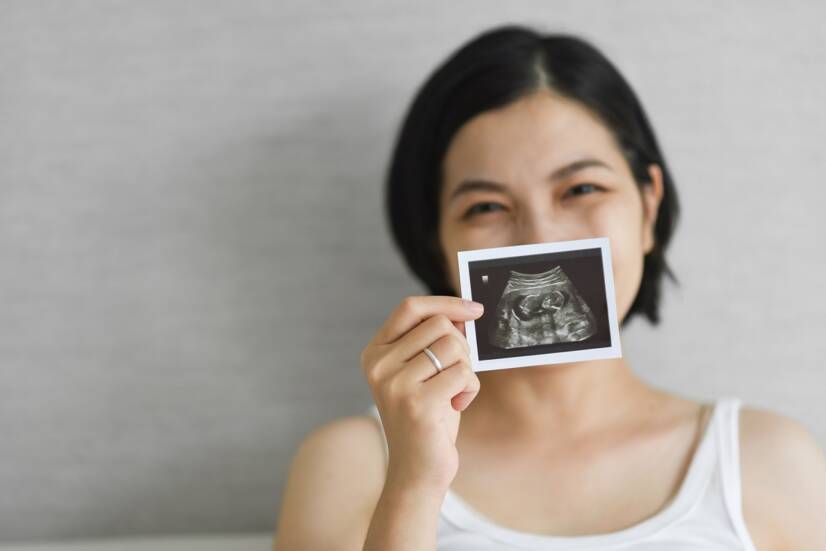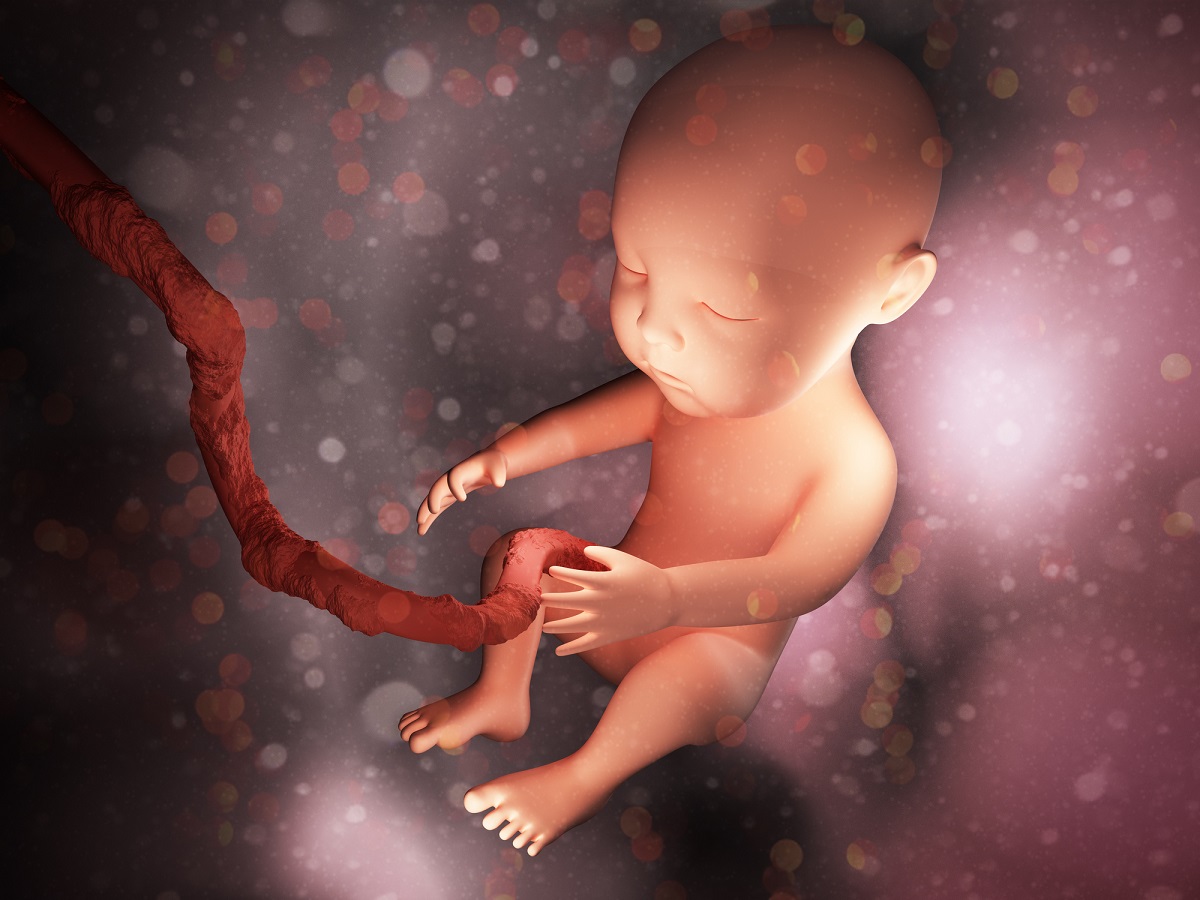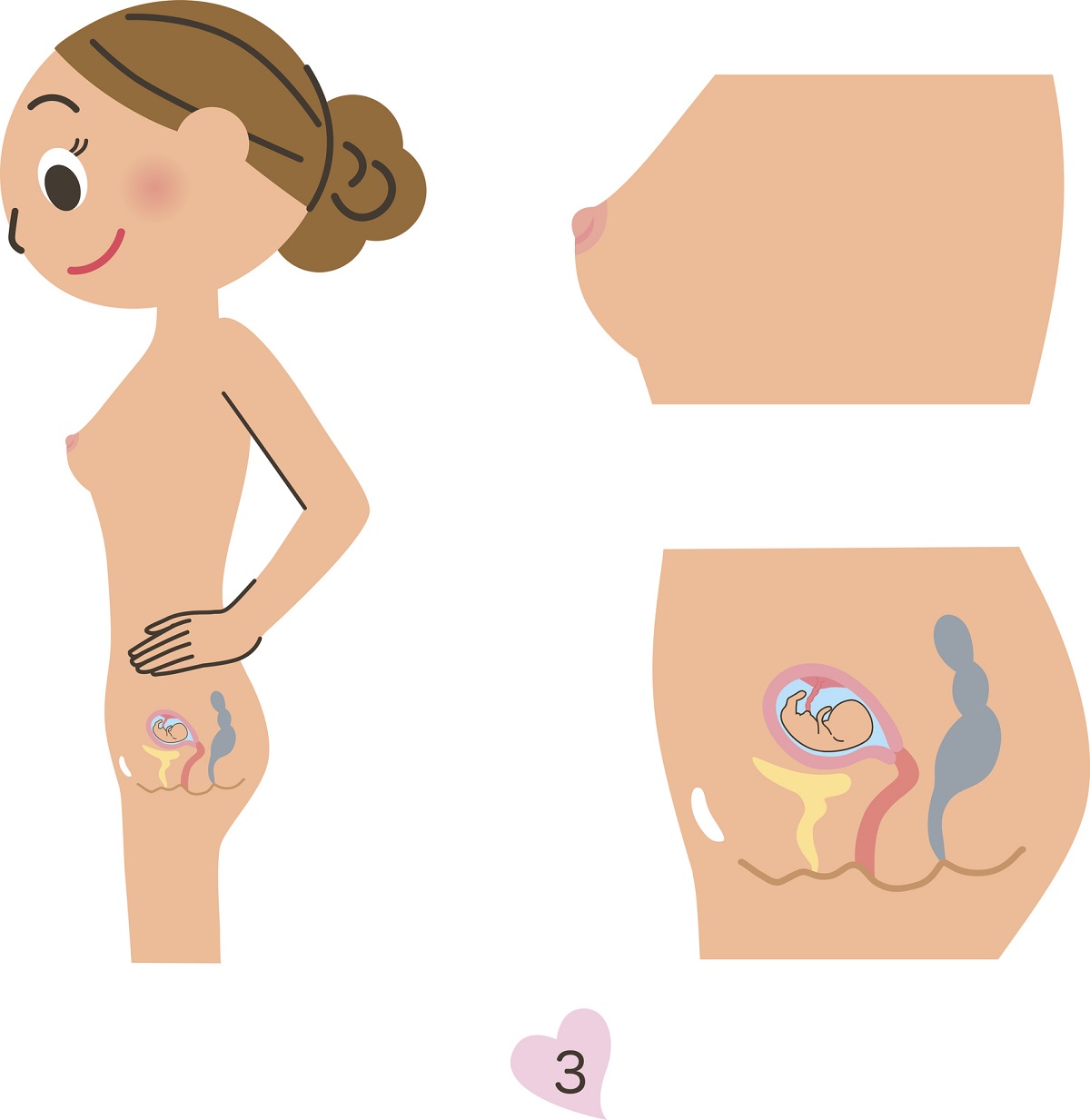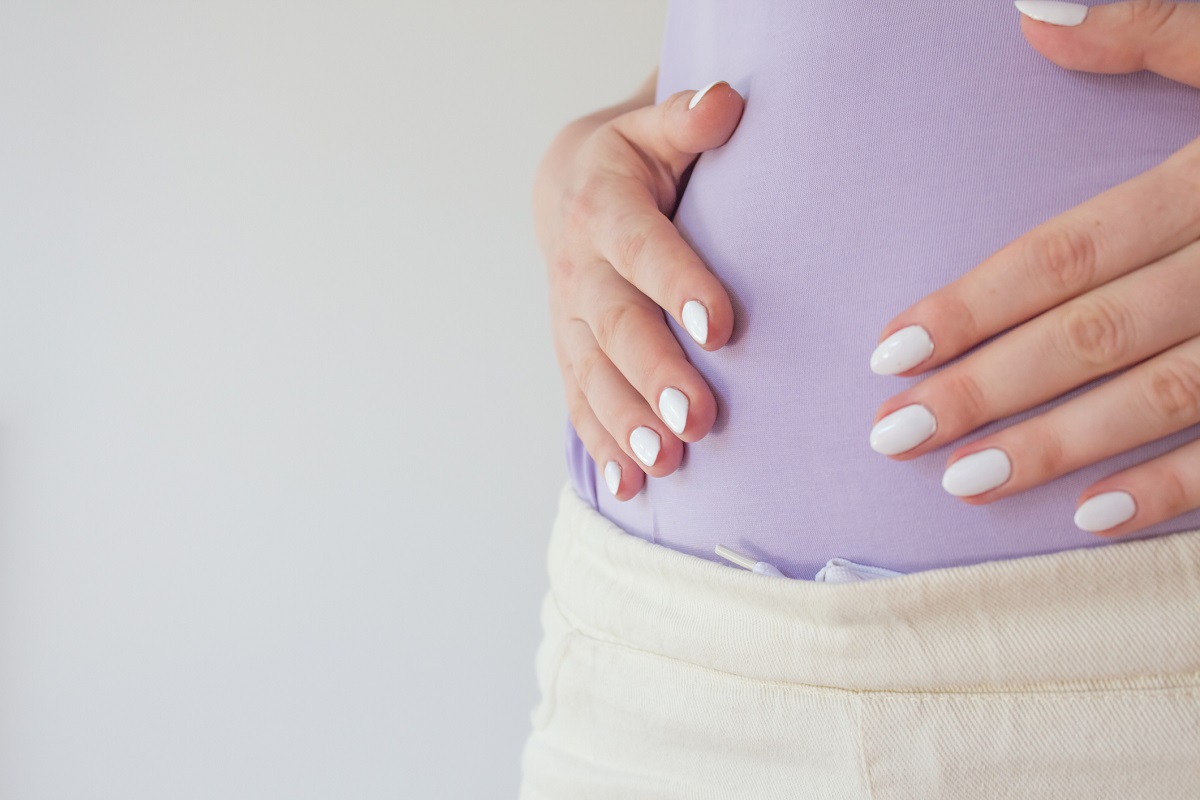- Pregnancy and Childcare - Jane Symons
- The Miraculous Journey to Life - Rainer Jonas
- verywellfamily.com - Week 12 of Your Pregnancy
- whattoexpect.com - 12 Weeks Pregnant
- nhs.uk - Week-by-week quide to pregnancy
Week 12 of pregnancy: does the fetus take the form of a real baby?

In the last three weeks your baby has doubled in size, growing at a very fast rate. He is already measuring approximately 5-6 cm from the top of his head to his tailbone.
Article content
How's your baby developing in your tummy?
The baby is fully developed, it's a real baby. It's just going to grow and get bigger in your tummy.
Its approximate size at this week is 55-66 mm and its weight is 14-19 g.
The skin of the fetus is still very soft and transparent.
His body is already starting to slowly become covered in fine lanugo hair at this week, which will gradually disappear by birth. The lanugo protects the fetal skin and will make it easier for the vernix to attach. Vernix is a gooey substance that forms later in development and also protects the fetal skin from both wetting and cracking of the skin.
By the 12th week, the fetus is fully formed and the breathing and swallowing reflexes are beginning to develop.
The inside of the oral cavity is covered with taste cells, which remain only on the tongue and palate after birth.
The baby's vocal cords also begin to form.
In this week, the intestines of the fetus begin to retract from the umbilical cord part into the abdomen. From the 12th week onwards, bowel movements begin and continue for about 6 weeks.
All the organs are already in place.
The liver is already developed enough to start making red blood cells.
At about this week, insulin production from the pancreas is already beginning and will gradually increase.
Your baby's sex organs are already visibly different.
The pituitary gland, located at the bottom of the fetal brain, is beginning to produce hormones.
Its bones are hardening due to the deposition of calcium, which it takes from the mother's body. Therefore, you should keep in mind to increase the calcium intake in the diet.
The bone marrow already produces white blood cells that will be tasked with fighting infections after birth.
The baby is constantly moving, doing somersaults, stretching, kicking, but you don't feel it yet. It's too small to exert the kind of force you would feel as a gentle kick.
The baby moves its face, smiles, frowns, sucks its thumb.
The table shows the approximate measurements of the fetus at 12 weeks, as measured by the sonographer
| Total length | CRL Distance from vertex to coccyx | Weight | HC Head circumference | BPD Transverse head diameter | AC Abdominal circumference | FL Femur length |
| 75 mm | 55-66 mm | 14-19 g | 70 mm | 20 mm | 63 mm | 10 mm |
Read more about fetal size in the article:
Ultrasound in pregnancy: fetal size, what is fetal biometry?
The placenta, which connects you to the fetus, is larger than the fetus. It is already fully functional and is beginning to take over the production of hormones that are needed to sustain the pregnancy. Until now, these hormones have been produced by the ovaries.

How does a woman feel in the 12th week of pregnancy
You are already finishing the first trimester of pregnancy and you are starting to see your tummy.
The uterus is getting bigger. Gradually, the belly starts to enlarge and protrude into the front, middle part of the abdomen.
Your breasts are getting bigger and may be even more sensitive to the touch.

At the end of the first and beginning of the second trimester, you may experience dizziness. This is caused by the hormone progesterone. Progesterone relaxes your blood vessels right around week 12, increasing blood flow to the fetus. The return to your bloodstream will therefore slow down.
You may experience lower blood pressure. Blood flow to the brain also decreases, causing you to feel dizzy. These occur especially when you get up abruptly. Another cause of feeling dizzy may be low blood sugar, which can occur with irregular eating.
Your sense of smell has developed quite a lot recently. You can smell what your neighbour has been cooking when you walk past his door. Smells and unpleasant odours can make you feel nauseous. Try carrying lemon oil with you and smell it. Citrus scents can counteract nausea.
Morning sickness slowly subsides and you feel better. Still, nausea can surprise you at any time of the day.
Cravings for different tastes of food may accompany you until the end of the first trimester, but then they will gradually subside.
You may feel hunger more often. The appetite increases so that the fetus is sufficiently nourished.
Finally, you will get a little rest from frequent visits to the toilet. The uterus has moved a little higher and no longer puts as much pressure on the bladder. Try Kegel exercises to help with labour and prevent pregnancy incontinence.
Don't forget to eat regularly to avoid the headaches and dizziness that low blood sugar can cause.
During the first trimester, your body was overloaded. It was constantly working to make the placenta. You felt more tired. If you are tired, rest and use your free time to sleep. In the later stages of pregnancy, your sleep will not be as good. And when your baby is born, you can say goodbye to sleep for a while.
The excessive saliva production should gradually fade away as you move into the second trimester.
Bloating and gas are common accompanying symptoms of pregnancy and can persist throughout your pregnancy.

What you may notice
Clothes start to feel tighter around your belly, even if your belly is still inconspicuous to others. Some women's belly is larger, others smaller, despite being in the same week of pregnancy. This is quite normal. It depends on the size and shape of the woman.
You may have noticed a change in your skin pigmentation. It may show up as brown spots on the face, especially on the forehead, above the upper lip or cheeks. These dark spots are called chloasma gravidarum or pregnancy mask. These spots usually persist until the end of pregnancy, in some women even after delivery.
The influence of pregnancy hormones can affect each woman and each pregnancy differently. In some women, sex appeal may increase, and in some, it may decrease.
Increased vaginal discharge is a result of hormonal activity.
Faster growth of nails and hair, which are thicker and shinier.
Pregnancy also affects your skin, which is more sensitive and prone to dryness and itching.
What kind of examinations do you expect in the pregnancy clinic at the 12th week of pregnancy?
Pregnancy counselling is very important to check and monitor the progress of your pregnancy and the development of the foetus.
In the early stages of pregnancy, the clinic is visited once a month.
At each counselling session, your blood pressure, pulse, weight gain and urine is tested for protein. In addition, any problems that may be troubling you, such as nausea, vomiting, constipation, the occurrence of varicose veins, back pain, and possible swelling of the lower limbs, are checked.
Between 11 and 13 weeks of pregnancy, an ultrasound is performed during the examination. It detects multiple pregnancies, abnormalities in the development of the fetus, which are assessed by measuring it, and monitors the activity of the heart, which you may already be able to hear.
The PAPP A test, a prenatal screening blood test, is taken between the 11th and 13th week of pregnancy. PAPP A is a component that is only found in the blood of pregnant women. It is used in the first trimester of pregnancy as one of the indicators of the presence of fetal birth defects.
From the 12th week onwards, blood sampling can also detect or exclude the presence of three chromosomes, i.e. diseases such as Down's syndrome, Patau's syndrome and Edwards syndrome.
In case of a good result from this blood test, a follow-up examination, which is done by amniocentesis, is not necessary.
What we recommend and what to look out for
- Drink plenty of fluids to stay hydrated. Especially in the warm season, don't forget to drink.
- Continue taking pregnancy supplements to give you the vitamins and trace elements you need.
- Eat a healthy diet with the addition of fresh fruits, vegetables and increased intake of folic acid.
- Increase the calcium in your diet. Your baby needs it for his or her developing bones and teeth. A lack of calcium also affects your health. Calcium is important not only for bones, but also for the muscles, heart, nerves and hormones of the developing foetus. Calcium can be found in dairy products, seeds, lentils, rhubarb, sardines, salmon and some leafy vegetables.
- Wear looser, more stretchy clothes that won't press on your tummy.
- Focus on skin care and skin care. Moisturise sufficiently with non-perfumed creams that do not weigh down the skin. Try natural cosmetics that are gentle on the skin and moisturise sufficiently.
- Try to limit your exposure to the sun and use creams with a high UV factor. Your skin is more sensitive and can burn more quickly and become irregularly pigmented.
- The skin of the breasts and abdomen is stressed throughout pregnancy and prone to stretch marks. By gently massaging and applying moisturizing creams, you can reduce and prevent unwanted stretch marks.
- Practice Kegel exercises. Pushing the baby out of the uterus is challenging for you and for the pelvic floor muscles, which have to stretch to the size of the head circumference. It is with these exercises that you will avoid pregnancy leakage, pregnancy and postpartum problems and also recover faster after delivery.
- Avoid colds and especially flu. Increase your vitamin intake by adding fruits and vegetables rich in vitamin C.
- Avoid alcohol, which can lead to serious health problems for the baby after delivery.
- Avoid seafood, oysters, mussels, even if cooked. These are banned in pregnancy because of the bad bacteria and parasites they may contain. Always cook fish thoroughly.
- Avoid unpasteurised milk and soft cheeses made from it. They may contain listeria.

Read also other interesting articles:
- With folic acid to the longed-for baby and healthy blood vessels?
- How much weight to gain during pregnancy? What does it depend on and what to look out for?
- What causes burning skin and what helps?
- Are you pregnant and suffering from lower abdominal pain?
- How to recognize pre-eclampsia and its symptoms in pregnancy? Know the risks
- Sex in pregnancy. What to watch out for and what changes does it bring?
Read more about the other weeks of pregnancy in the summary article.
Gallery




Interesting resources
Related










